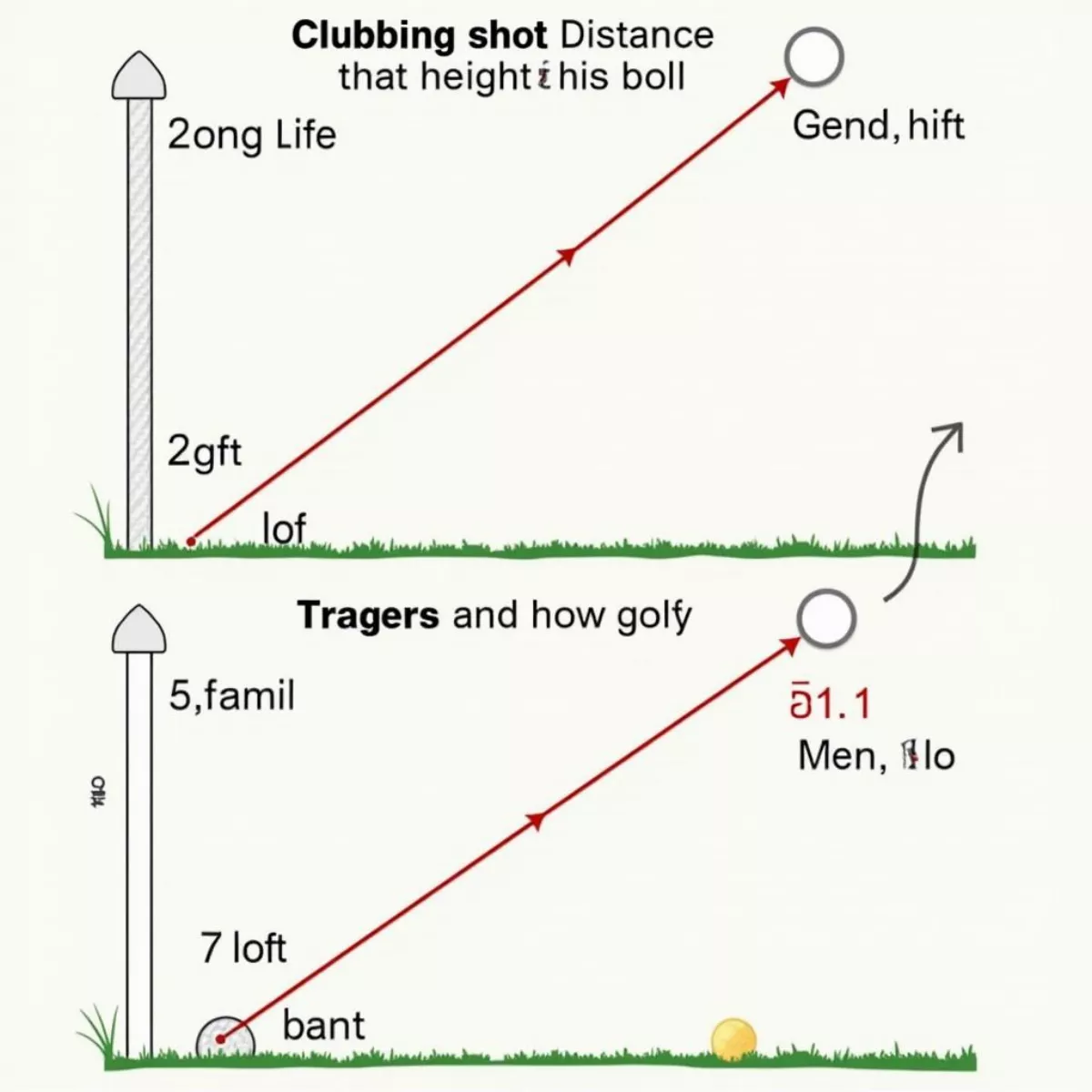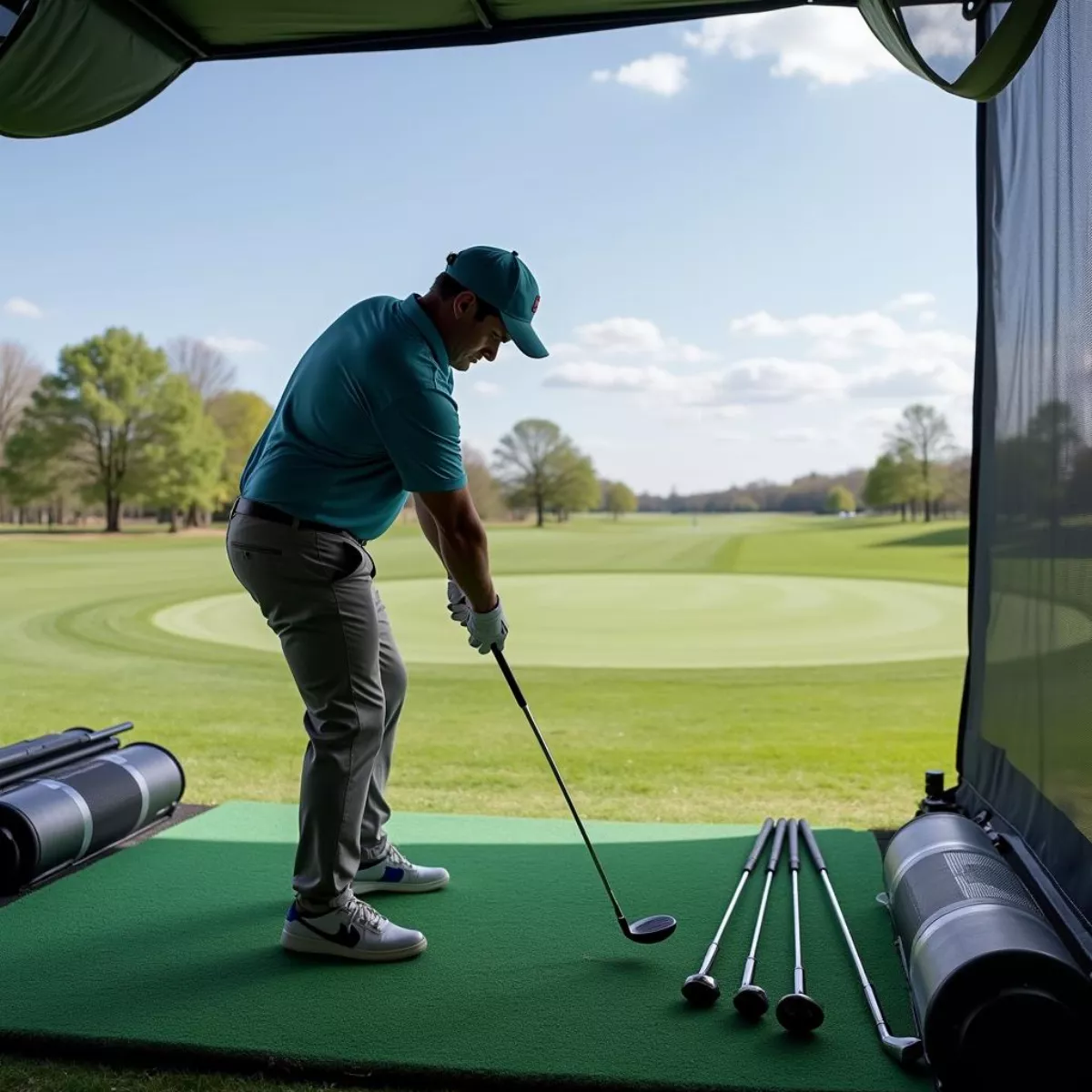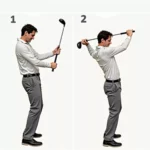Golf is a game of precision, strategy, and skill. One term that you’ll often hear on the course is “club up.” But what does it really mean to “club up,” and why is it important for improving your game? In this guide, we’ll delve into the nuances of this phrase, its implications for your game, and strategies for effectively applying it during your next round.
What Does “Club Up” Mean?
In the simplest terms, “club up” refers to the practice of selecting a golf club that has a higher loft than the one you would ordinarily use for a given shot distance. For example, if you typically use a 7-iron for a particular shot, “clubbing up” would mean choosing a 6-iron instead.
This decision often stems from various factors, including wind conditions, elevation changes, your own physical condition, or simply a desire to control distance and trajectory better.
 Golfer Choosing Club
Golfer Choosing Club
Why Club Up?
Clubbing up is more than just a rule of thumb; it’s a strategic decision that can significantly impact your performance. Here are a few reasons why you might consider clubbing up:
- Increased Control: By using a club with a higher loft, you may gain better control over your shot, particularly if you have less than ideal conditions.
- Soften the Impact: Using a more forgiving club can help you achieve a softer landing on the green, particularly beneficial for approach shots.
- Overcoming Environmental Variables: Wind and elevation play significant roles in golf. Clubbing up can counteract these factors effectively.
- Enhanced Trajectory: A higher loft allows for a higher trajectory, which can be useful for holding greens, particularly those that are elevated.
Factors Influencing the Decision to Club Up
- Wind Direction: Strong headwinds may require you to club up.
- Elevation: Shots from a higher tee box or uphill lie may necessitate an extra club.
- Lie of the Ball: If your ball is in thick grass or has an awkward lie, you may need a club with more loft.
- Temperature: Cold weather reduces ball distance; clubbing up can compensate.
 Golf Ball Flight Trajectory
Golf Ball Flight Trajectory
How to Make the Right Club Selection
Making the decision to club up isn’t arbitrary. It requires skill and judgment. Here’s how to refine your decision-making process:
- Evaluate the Distance: Measure how far you typically hit your clubs in ideal conditions.
- Consider the Conditions: Assess wind, slope, and turf conditions.
- Previous Experience: Understand how your game reacts to similar conditions. Did you under-hit or over-hit?
- Trust Your Instincts: Sometimes, your gut feeling is the best guide.
The Importance of Practice
The more you practice under different conditions, the better you’ll become at making these kinds of strategic decisions. Consider practicing with your clubs in various weather conditions to get a feel for what works best.
Practical Tips for Clubbing Up
Here are some practical tips to keep in mind when deciding to club up:
- Experiment on the Range: Spend time at the driving range to understand how different clubs react under various conditions.
- Keep a Scorecard: Document the shots where you opted to club up to analyze your decision-making after your rounds.
- Consult with a Pro: If you’re unsure, take a lesson. A professional can help you understand when to club up and why.
- Stay Consistent: Once you find a method that works for you, especially regarding clubbing up, stay consistent with it. Develop a routine.
 Golfer Practicing on Range
Golfer Practicing on Range
Mental Aspect of Clubbing Up
Many players struggle with the mental aspect of clubbing up. Here are a few tips for overcoming the psychological barriers:
- Visualize Success: Picture yourself making the right shot with the upgraded club, which can help alleviate anxiety.
- Trust Your Gut: Often, your initial instinct about whether to club up is the right one.
- Stay Positive: Maintain a positive mindset, regardless of the outcome; every mistake is an opportunity to learn.
Key Takeaways
- Clubbing up means selecting a higher-lofted club for a shot to gain better control.
- Factors such as wind, elevation, and ball lie can influence your decision.
- Practice regularly to understand your club distances and reactions under different conditions.
- Maintain a positive mindset to combat the fears associated with clubbing up.
Frequently Asked Questions (FAQs)
1. How do I know when to club up?
Evaluate flight conditions, distance, and your personal comfort with each club.
2. Does clubbing up always mean better shots?
Not always, but it can increase your chances of a controlled shot under certain conditions.
3. How much distance should I expect when I club up?
Typically, changing to a higher club loft may increase your distance by about 5-10 yards, depending on the club and conditions.
4. Should beginners club up regularly?
Yes, particularly in challenging conditions, as it often leads to a more controlled shot.
5. Can clubbing up backfire?
Yes, if not done thoughtfully, it can lead to mishits. Make sure to assess conditions before making the choice.
6. How can I practice clubbing up effectively?
Use a driving range while simulating different environmental conditions to practice your decision-making.
7. What clubs do most players club up with?
Most commonly, players will club up with their mid-irons, like moving from a 7-iron to a 6-iron or from a 6-iron to a 5-iron.
8. Does clubbing up change my grip?
Not necessarily, but adjusting your grip might be required depending on your comfort and stance.
9. How can I ask for advice on clubbing up?
Consult your golfing buddies or a professional coach who can provide personalized insight.
10. Is it worth taking a lesson to learn more about clubbing up?
Absolutely! A professional can offer valuable insight that can enhance your understanding and application of clubbing up in your game.
By understanding the concept of clubbing up and incorporating these strategies into your game, you give yourself the opportunity to improve your overall performance on the course. Remember, every golfer has a unique playing style, so take time to discover what works best for you! Happy golfing!

